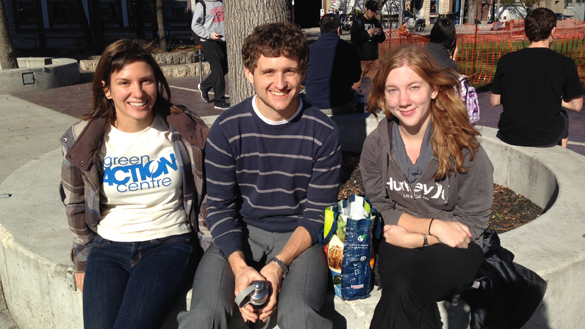Bottled water is fast becoming the unwanted guest at events, both indoor and outdoor. Why so unpopular? First, there’s the environmental impact of producing single-use plastic water bottles as well as transporting them. Then there’s the waste involved with those that are not recycled and end up in the landfill. In Manitoba, 64% of plastic pop bottles were recycled in 2014 (source), which in itself takes energy and resources. Finally, there are the health equity implications of requiring people to pay for water at a public event. For a full explanation of the environmental impacts, check out this video: The Story of Bottled Water
 So, if you’re organizing an outdoor festival or other public event. With the lack of public water fountains, how do you keep everyone hydrated without resorting to providing bottled water, either free or for a fee?
So, if you’re organizing an outdoor festival or other public event. With the lack of public water fountains, how do you keep everyone hydrated without resorting to providing bottled water, either free or for a fee?
Rather than reinvent the wheel, here’s an excellent resource – Free Your Event from Bottled Water [pdf] created by Food & Water Watch. It provides step-by-step planning and case studies as well as this handy checklist:
Step 1: Learn whether the venue will allow you to serve exclusively tap water (more so for indoor events, such as a conference).
Step 2: Calculate how much water your event requires – the average is 1 litre per person (1.5L on a hot day). This also helps identify how many plastic water bottles you will be avoiding at your event, which is handy for promotional and educational purposes. For example, based on a plastic water bottle size of 0.5L, an event with daily attendance of 1,000 people drinking 1L water each equals 2,000 bottles of water per day. On a hot day, it would mean 3,000 plastic bottles avoided.
Step 3: Find the best tap water source – municipalities will sometimes rent water trucks for public events. In Winnipeg, call or email 311@winnipeg.ca for costs and to book.
Step 4: Decide whether to use a water filtration device, if applicable.
Step 5: Plan water station set-up and distribution – evenly spaced, accessible and ideally self-serve.
Step 6: Select water containers – consider selling or giving away donated reusable water bottles for those who don’t bring their own container. For an indoor event like a conference or meeting, you may want to rent glasses.
Step 7: Contact potential partners for the event.
Step 8: Develop marketing and publicity – advertise the event from the beginning as bottled water free and notify attendees multiple times. Create signs directing attendees to water stations.
Step 9: Plan for provision of water to speakers and exhibitors, as well as for field trips or other special situations. Ensure all exhibitors and vendors know you don’t want any bottled water at the event.
Step 10: Recruit and schedule staff and volunteers to assist the day of the event.




Why can’t I get a simple answer regarding a 15 L green water bottle?
Is it garbage or should it be recycled? In either case, should I crush it or
throw it in uncrushed?
Hi Allan,
To be able to give you an answer, to clarify, is this a 1.5 L water bottle, or is it 15 L? If it’s a 1.5 L water bottle, yes, it can be recycled in your blue box, and there’s no need to crush the bottle. If it is a 15 L water jug, then it would have to be brought to one of Winnipeg’s 4R depots in the Large Plastics Bin. This is if you live in Winnipeg though.